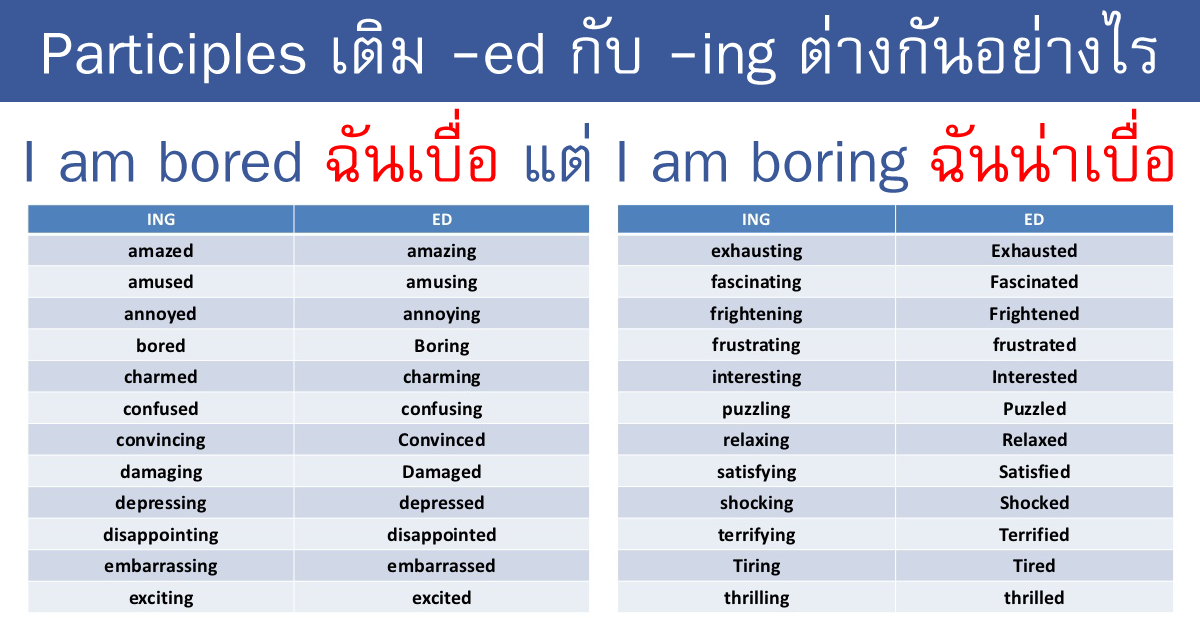Participles คืออะไร การเติม ed และ ing ต่างกันอย่างไร แปลว่าอะไร ใช้อย่างไร

Participles หมายถึง คำกริยาที่ใช้เป็นคุณศัพท์ขยายนาม โดย
เติม – ing แสดงว่านามนั้นเป็นผู้กระทำกริยา หรือ
เติม – ed แสดงว่านามนั้นเป็นผู้ถูกกระทำ
-ed กับ -ing ต่างกันอย่างไร
มาดูความหมาย วิธีใช้ และตัวอย่างประโยคกันครับ
การเติม -ed
use to describe how people feel
ใช้สำหรับบรรยายความรู้สึกของคน
bored = (รู้สึก) เบื่อ
interested = (รู้สึก) สนใจ
excited = (รู้สึก) ตื่นเต้น
confused = (รู้สึก) สับสน
surprised = (รู้สึก) แปลกใจ
frustrated = (รู้สึก) ท้อแท้
ตัวอย่างประโยคภาษาอังกฤษ
Jimmy had nothing to do. He was very bored.
จิมมี่ไม่มีอะไรทำ เขาเบื่อมาก
การเติม -ing
use to describe something that causes an emotion
ใช้สำหรับอธิบายบางสิ่งที่เป็นสาเหตุให้เกิดอารมณ์ความรู้สึกนั้น
boring = น่าเบื่อ
interesting = น่าสนใจ
exciting = น่าตื่นเต้น
confusing = น่าสับสน
surprising = น่าแปลกใจ
frustrating = น่าท้อแท้, น่าผิดหวัง
ตัวอย่างประโยคภาษาอังกฤษ
The movie was interesting. I want to watch it again.
หนังเรื่องนั้นน่าสนใจ ฉันอยากดูอีก
Present Participles
กริยาที่เติม – ing โดยวางอยู่หน้าคำนาม แสดงว่าเป็นผู้
กระทำกริยานั้น และเป็นวลีที่ใช้รวมประโยค Simple Sentence 2 ประโยคเข้าเป็นประโยคเดียวกันได้
ตำแหน่งและหน้าที่ของ Present Participles
1. วางอยู่หน้าคำนาม จะเป็นดังรูป V.ing + noun
Mary is a working woman.
2. เป็นวลีอยู่หน้าคำอื่นๆ ดังรูป V.ing + word or words ซึ่งประโยค Simple Sentence 2 ประโยคที่มีประธานเป็นคนเดียวกันมารวมกันเป็นประโยคเดียวกัน โดยตัดประธานอีกตัวทิ้ง กริยาที่เกิดก่อนทำเป็น V.ing
Seeing her father, Mary ran away.
มาจาก Mary saw her father. และ Mary ran away.
Past Participles
Past Participles คือกริยาช่องที่ 3 ที่วางไว้หน้าคำนามเพื่อแสดงว่านามนั้นเป็นผู้ถูกกระทำ และเป็นวลีที่ใช้รวมประโยค Simple Sentence 2 ประโยคเข้าเป็นประโยคเดียวกัน
ตำแหน่งและหน้าที่ของ Past Participles
1. วางอยู่หน้าคำนาม (V3 + noun) หรือ หลังคำนาม (noun + V3) เมื่อเป็น transitive verb ( กริยาที่ต้องมี
กรรมมารับ) หรือ วางไว้หน้าคำนามที่เดียวเท่านั้น เมื่อเป็น intransitive verb ( กริยาที่ไม่ต้องมีกรรมมารับ) ตัวอย่างเช่น
transitive verb :
The car which was stolen last week is mine.
จะได้ The car stolen last week is mine.
The stolen car last week is mine.
intransitive verb :
Please change the flowers which were faded in the living room.
จะได้ Please change the faded flowers in the living room.
2. วางอยู่หลัง verb to be จะเป็น passive voice (is, am, are, was, were + V.3) เช่น
John was punished by his teacher.
3. เป็นวลีที่อยู่หน้าคำอื่น ๆ (V.3 + word or words) โดยรวมประโยค Simple Sentence 2 ประโยคเข้าด้วยกันเป็นประโยคเดียว โดยตัดประธานออก 1 ตัว กริยาที่เกิดก่อนทำเป็น V.3 เช่น
He was punished by his teacher. He cried loudly.
Punished by his teacher, he cried loudly.
4. Past Participle ใช้ Adverb ขยายได้ (Adv. + past participle + noun) เช่น
a well-designed dress
การรวมประโยค Simple Sentence
1. เมื่อประธานเป็นตัวเดียวกัน มีหลักดังนี้
– ถ้าประธานเป็น noun และ pronoun ให้ตัดประธานที่เป็น pronoun ทิ้ง
– ถ้ากริยาที่เกิดขึ้นก่อนเป็น active form และเป็น past simple tense ให้เปลี่ยนกริยาเป็น present participle ( V-ing) เช่น
He believed in her story. He gave her hundred baht.
Believing in her story, he gave her hundred baht.
– ถ้ากริยาที่เกิดขึ้นก่อนเป็น passive form อยู่ในรูป Verb to be + V3 ให้ตัด Verb to be ออกให้เหลือ V3 (past participle) หรือใช้ being + V3 เช่น
She was arrested by the police. She was sent to the prison.
Arrested by the police, she was sent to the prison.
Being arrested by the police, she was sent to the prison.
– ถ้ากริยาที่เกิดขึ้นก่อนเป็น active form และเป็น past perfect tense คืออยู่ในรูป had + V3 ให้เปลี่ยน had เป็น having หรือตัด had ทิ้งแล้วเปลี่ยน V3 เป็น V-ing
He had worked hard all week. He felt tried.
Having worked hard all week, he felt tried.
Working hard all week, he felt tried.
2. เมื่อประธานไม่ใช่ตัวเดียวกัน มีหลักดังนี้
– ไม่ตัดประธานของทั้ง 2 ประโยคออก
– ถ้ากริยาที่เกิดก่อนเป็น Active form อยู่ในรูป past simple tense ให้เปลี่ยนกริยาเป็น (had + V3) และเปลี่ยน had ให้เป็น having เช่น
She walked in the park. A dog bit her.
She having walked in the park, a dog bit her.
– ถ้ากริยาที่เกิดก่อนเป็น Passive form ( verb to be + V.3)ให้เปลี่ยน เป็น had been + V.3 แล้วเปลี่ยน had เป็น having
She was taken to hospital. The doctor examined her.
She having been taken to hospital, the doctor examined her.
– ถ้ากริยาที่เกิดก่อนเป็น Active form อยู่ในรูป had + V.3 ให้เปลี่ยน had เป็น having
He had worked for five days. His job was finally finished.
He having worked for five days, his job was finally finished.
เรียนเรื่อง participle อย่างละเอียด ได้ที่
![]() Participle คืออะไร
Participle คืออะไร




